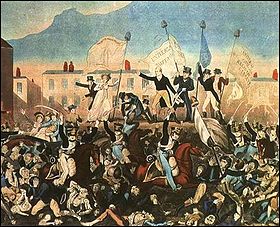12 June 2007
50,000th Issue of Guardian: A Moral Compass for the Digital Media Age?

I read yesterday's Guardian. This was the 50,000th edition of the newspaper, first published as the Manchester Guardian on 5th May 1821. The paper is justifiably proud of its leadership role in articulating liberal opinion over its long history, and of its role in defending the freedom of the press in the UK. It is equally proud of its role in the vanguard of the new media, being the leading online UK newspaper with many readers oversees.
In a strange synergy, I only recently listened to the excellent BBC podcast of the In Our Time discussion of the so-called Peterloo Massacre (BBC In Our Time Podcast), nearly two years earlier on 16th August 1819 and pictured above. This event was pivotal in the Guardian's history, as it inspired the founder John Edward Taylor to establish the paper as a forum for political debate. The Wikipedia Article on the Peterloo Massacre gives the background of the reform movement and the massacre.
I have added below some extracts from the front page article in the Guardian that places the Guardian within its historical context Napoleon to Iraq, and still going strong | 50,000 | Guardian Unlimited.
In 1821, John Edward Taylor, who had written the first eyewitness account of Peterloo, managed to raise the capital to print some 1,000 copies of the Manchester Guardian - intended, according to the prospectus, to be read by "the class to whom, more especially, advertisements are generally addressed".
...
Today's Guardian is, each month, read by 16 million "unique users" (Scott would wince), nearly a third of them in America. In the years since the great editor wrote those words - ever forward looking as others looked back - the Guardian has moved from being a provincial morning paper (albeit with a remarkable international reputation) to being the most-read British newspaper website in the world. On this new digital frontier more Americans read the Guardian today than read the Los Angeles Times.
...
We're with the grand old man: what a change, what a chance! The liberal values the Guardian has represented since 1821 are the same values which the new technologies today make possible: plurality of voice; diversity of opinion; an internationally shared discourse; a voice for the hitherto voiceless; a challenge to authority; freedom of speech and information; fairness and tolerance; the possibility of enlightened argument without legal or state restraint. All these are now imaginable, if not yet universal. The liberal imperative to promote them has never been more vital.
Stirring words indeed, and a lesson to all of us who work in information communications technologies and media to key a weather eye on our own moral compass, and have a strong view on what is best for all of our society.
Tweet Posted by mofoghlu at June 12, 2007 5:04 PM | TrackBack